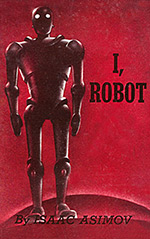
![]() attackofthebooks
attackofthebooks
9/30/2014
![]()
I, Robot. Is there a selection from the golden age of science fiction that better epitomizes the era?
There's no doubt that Isaac Asimov's I, Robot is a science fiction classic. Complete with the three laws of robotics, it casts a tall shadow over almost every work of science fiction, book or movie, and you hear echoes, loud and soft, anywhere on artificial intelligence or robotics appears.
Whether it is Bishop in Alien ("It is impossible for me to harm, or, by omission of action, allow to be harmed, a human being."), C-3PO in Star Wars ("It's against my programming to impersonate a deity."), or the android Data of Star Trek: The Next Generation fame, whose role in the show seems to be guided by examination of the themes in I, Robot, Asimov's laws have made an impression that place the novel firmly in the science fiction canon.
As I reread I, Robot recently, considering these themes and how Asimov told his tale, and what the I, Robot's legacy should be, I was struck with how much science fiction has changed, and yet owes a debt to Asimov. Even this year's winner of the Hugo for best novel, Ancillary Justice by Ann Leckie, resonates with themes about artificial intelligence embodied and self-examining the rules and justifications for existence, not unlike I, Robot. But unlike Asimov's highly logical tales–I, Robot is structured more like a collection of stories that follow the introduction of robots and artificial intelligence to society–Leckie's novel is a space opera, focused more on existential drama and emotion than on hard science and logic. Anyone can enjoy Leckie's fiction–well, almost anyone–but Asimov's writing lends itself more to the devotee of the genre, to the engineer, to the aficionado of the hard sciences. He believed that the only constant in history was change, and that it was the role of science fiction to guess at what the future would be. "Individual science fiction stories may seem as trivial as ever to the blinder critics and philosophers of today — but the core of science fiction, its essence, the concept around which it revolves, has become crucial to our salvation if we are to be saved at all."
Meanwhile, much of today's science fiction seems to focus less on the science and more on the pet political issues of its writers. Asimov was no shrinking violet when it came to politics or religion (he was an atheist and dismissive of those who believed in divinity), but neither was he one to allow society to get in the way of the science in his fiction, including I, Robot. Looking at other Hugo winners, he would have enjoyed Mary Robinette Kowal'sThe Lady Astronaut of Mars, a tale about the first lady astronaut to go to Mars considering how to return to the stars, but Asimov would have scratched his head over John Chu's "The Water That Falls on You from Nowhere," which is best described as two gay guys having sex on a couch when they magically take the ice bucket challenge.
(I think he would have been just fine with Charles Stross, a multiple Hugo nominee and recipient this year, especially since Stross explicitly cites and applies the three laws of robotics found in I, Robot in his Saturn's Children).
Looking at these Hugo winning selections, its easy to see some relationship to Asimov's influence and I, Robot, but also to see complete aversion to a hard science effort at fiction. Sure, readers expectations have shifted, writing styles have changed, and we've caught up to what was then the future in I, Robot. But what made Asimov resonate was a view to the future that was hopeful and expectant (mostly), believing that we could dream up ways to solve our problems with technology as our tools.
Or maybe I'm reading too much into Asimov. But I don't think so. There may not be the gripping and exciting action scenes or the touchy-feely interviewing of heavy-handed political messages (I'm looking at you, Nancy Kress and your After the Fall, Before the Fall, During the Fall), but it's hard to walk away from I, Robot without wanting to then stop by the Radio Shack and pick up a few gadgets and gizmos to maybe try putting together a robot or two of your own. That's the kind of science fiction I like, and that's the kind I hope more modern writers will write.
http://www.attackofthebooks.com/robot-isaac-asimov-modern-scifi-owes-debt/